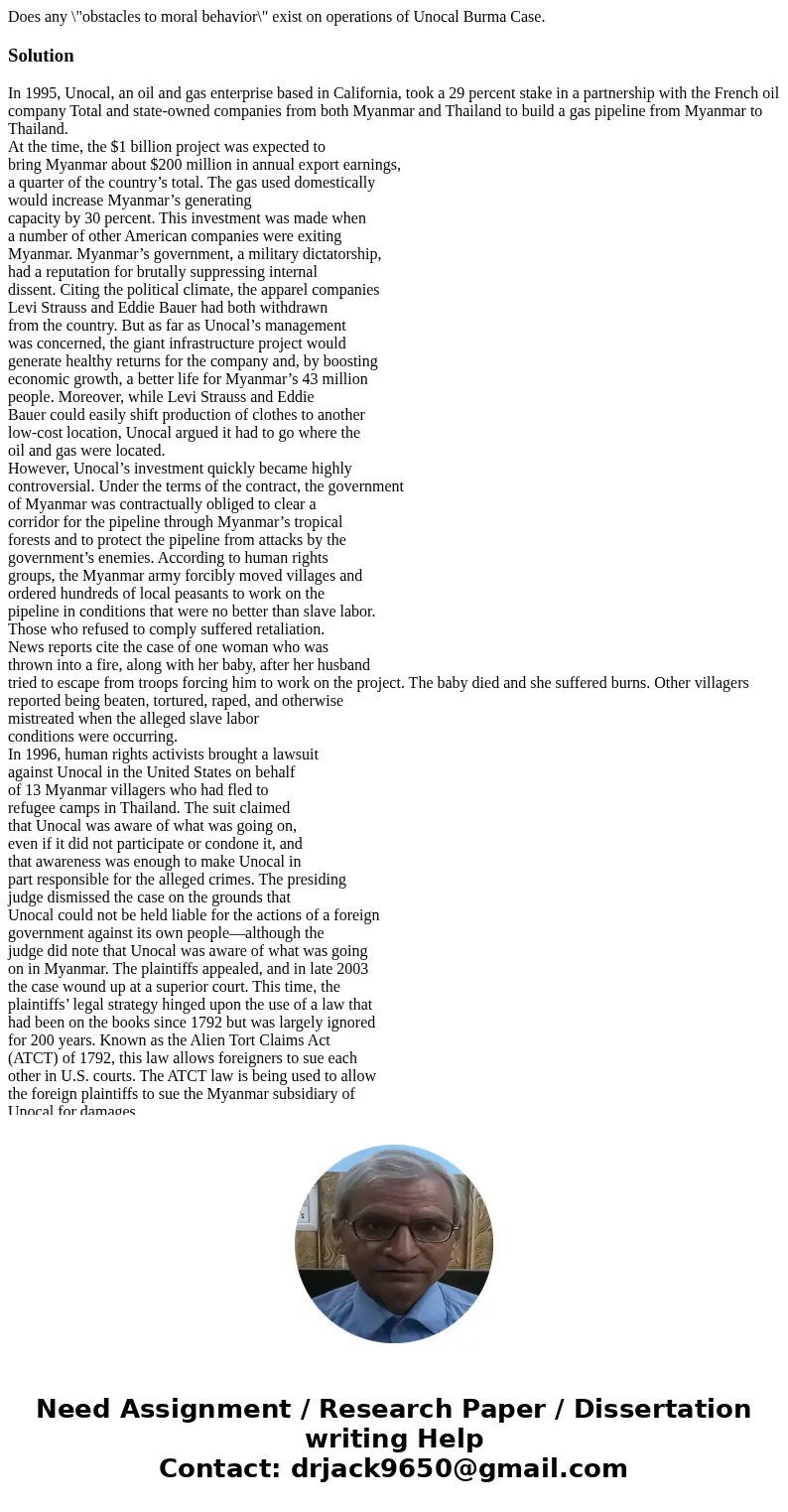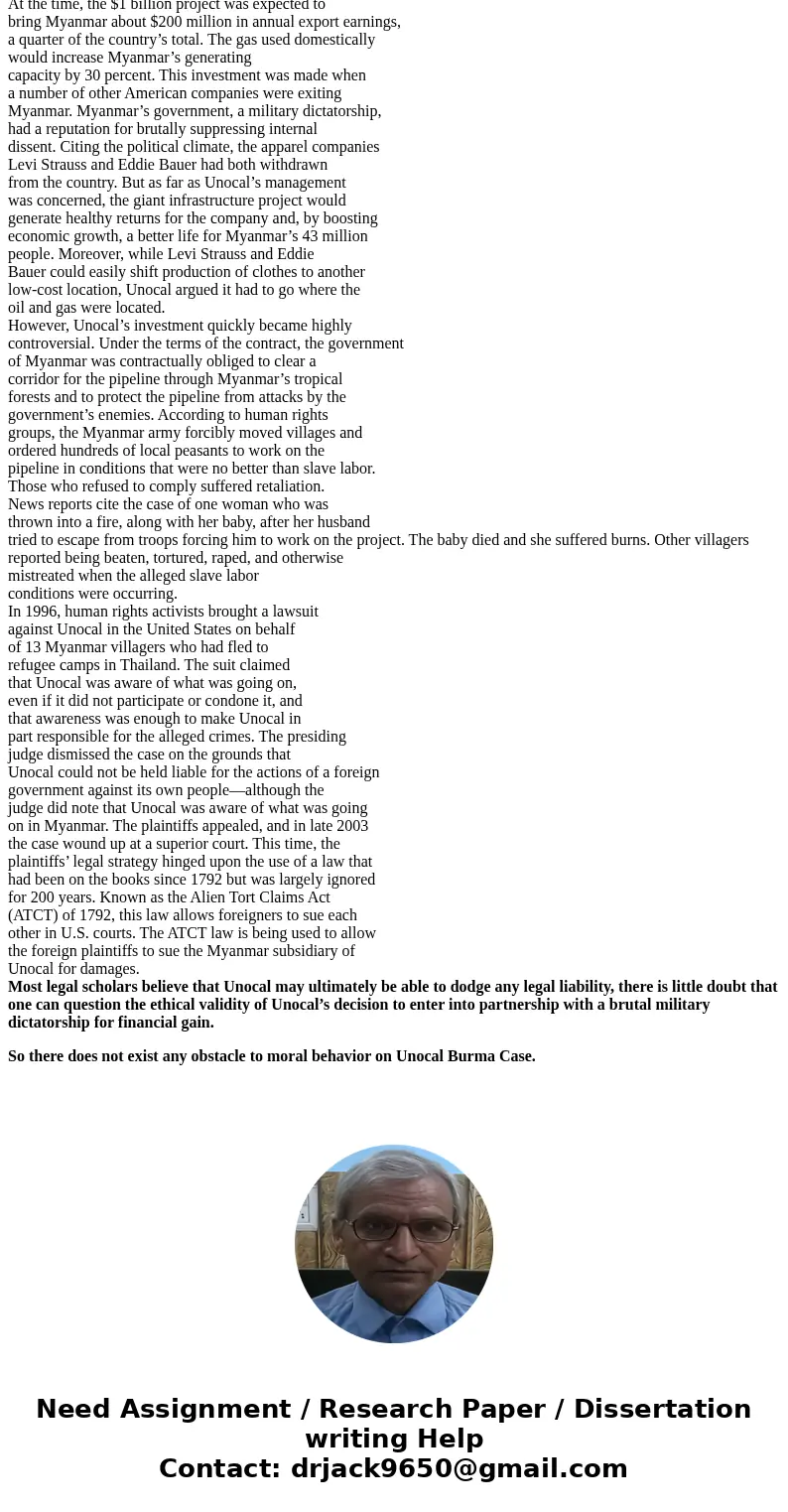Does any obstacles to moral behavior exist on operations of
Does any \"obstacles to moral behavior\" exist on operations of Unocal Burma Case.
Solution
In 1995, Unocal, an oil and gas enterprise based in California, took a 29 percent stake in a partnership with the French oil company Total and state-owned companies from both Myanmar and Thailand to build a gas pipeline from Myanmar to Thailand.
At the time, the $1 billion project was expected to
bring Myanmar about $200 million in annual export earnings,
a quarter of the country’s total. The gas used domestically
would increase Myanmar’s generating
capacity by 30 percent. This investment was made when
a number of other American companies were exiting
Myanmar. Myanmar’s government, a military dictatorship,
had a reputation for brutally suppressing internal
dissent. Citing the political climate, the apparel companies
Levi Strauss and Eddie Bauer had both withdrawn
from the country. But as far as Unocal’s management
was concerned, the giant infrastructure project would
generate healthy returns for the company and, by boosting
economic growth, a better life for Myanmar’s 43 million
people. Moreover, while Levi Strauss and Eddie
Bauer could easily shift production of clothes to another
low-cost location, Unocal argued it had to go where the
oil and gas were located.
However, Unocal’s investment quickly became highly
controversial. Under the terms of the contract, the government
of Myanmar was contractually obliged to clear a
corridor for the pipeline through Myanmar’s tropical
forests and to protect the pipeline from attacks by the
government’s enemies. According to human rights
groups, the Myanmar army forcibly moved villages and
ordered hundreds of local peasants to work on the
pipeline in conditions that were no better than slave labor.
Those who refused to comply suffered retaliation.
News reports cite the case of one woman who was
thrown into a fire, along with her baby, after her husband
tried to escape from troops forcing him to work on the project. The baby died and she suffered burns. Other villagers
reported being beaten, tortured, raped, and otherwise
mistreated when the alleged slave labor
conditions were occurring.
In 1996, human rights activists brought a lawsuit
against Unocal in the United States on behalf
of 13 Myanmar villagers who had fled to
refugee camps in Thailand. The suit claimed
that Unocal was aware of what was going on,
even if it did not participate or condone it, and
that awareness was enough to make Unocal in
part responsible for the alleged crimes. The presiding
judge dismissed the case on the grounds that
Unocal could not be held liable for the actions of a foreign
government against its own people—although the
judge did note that Unocal was aware of what was going
on in Myanmar. The plaintiffs appealed, and in late 2003
the case wound up at a superior court. This time, the
plaintiffs’ legal strategy hinged upon the use of a law that
had been on the books since 1792 but was largely ignored
for 200 years. Known as the Alien Tort Claims Act
(ATCT) of 1792, this law allows foreigners to sue each
other in U.S. courts. The ATCT law is being used to allow
the foreign plaintiffs to sue the Myanmar subsidiary of
Unocal for damages.
Most legal scholars believe that Unocal may ultimately be able to dodge any legal liability, there is little doubt that one can question the ethical validity of Unocal’s decision to enter into partnership with a brutal military dictatorship for financial gain.
So there does not exist any obstacle to moral behavior on Unocal Burma Case.


 Homework Sourse
Homework Sourse